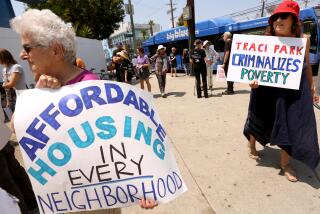At SXSW, the ‘homeless hotspot’ experiment spurs slams, sarcasm
“Homeless hot spots” began as a charitable experiment at the SXSW Interactive conference in Austin, Texas, but quickly morphed into a debate about the ethics of bridging the digital divide.
It started with a blog post by the New York-based marketing company BBH Labs (short for Bartle Bogle Hegarty).
“This year in Austin, as you wonder [sic] between locations murmuring to your coworker about how your connection sucks and you can’t download/stream/tweet/instagram/check-in, you’ll notice strategically positioned individuals wearing ‘Homeless Hotspot’ T-shirts,” according to BBH. “These are homeless individuals in the Case Management program at Front Steps Shelter. They’re carrying MiFi devices. Introduce yourself, then log on to their 4G network via your phone or tablet for a quick high-quality connection.”
The idea was based in part on a BBH intern project that got the homeless tweeting, called Underheard in NY.
But how would the SXSW hot spots benefit the homeless? The model was supposed to mimic Street Newspapers, which homeless vendors hawk in various cities. According to the BBH blog, with the homeless hot spots, “You pay what you want (ideally via the PayPal link on the site so we can track finances), and whatever you give goes directly to the person that just sold you access. We’re believers that providing a digital service will earn these individuals more money than a print commodity.”
“We’re using SXSW as our beta test,” BBH wrote. “Hopefully you can help us optimize and validate this platform, which we hope to see adopted on a broader scale. Any and all support is appreciated (including donations from afar).”
The beta test, which ends Monday, drew several outspoken critics.
Tim Carmody at Wired said the project “sounds like something out of a darkly satirical science-fiction dystopia,” pointing out that beyond the few dollars they earn, homeless participants gain nothing in the long term, and lose a measure of their humanity.
“The digital divide has never hit us over the head with a more blunt display of unselfconscious gall,” Jon Mitchell posted on ReadWriteWeb from the conference in Austin.
Mitchell even took issue with the T-shirts identifying those with hot spots, implying the “science experiment” has turned participants identified in promotional photos as “Clarence” and “Dusty” into inanimate objects.
“The shirt doesn’t say, ‘I have a 4G hotspot,’ ” he wrote, “It says, ‘I am a 4G hotspot.’ ”
He goes on to dismiss the hot spots as well-meaning “helpless pieces of privilege-extending human infrastructure.”
“This conference is so hugely, expensively over the top as a monument to the privilege of Internet access that I didn’t think it could top itself,” he wrote. “It just did.
Eric Berger, science blogger at the Houston Chronicle, linked to the post and said he also found the homeless hot spots troubling.
“It has to do with digital divides, haves and have nots, and the idea that a fellow human being is of no more use to you than as an Internet jack,” he wrote.
Other critics ladled on the sarcasm.
“I’ve got a troubleshooting issue that I hope you can resolve: my homeless hotspot keeps wandering out of range, and it’s ruining all my day trades! How am I supposed to remotely manage my stock portfolio if my internet connection is actually an ITINERANT connection?” tweeted David Kraftsow. “There must be something the brilliant creative minds at BBH can do to help me out. Maybe by further commodifying human life somehow? ... Anyway, please consider strapping weights to their shins or tethering them to a fence.”
The head of innovation at BBH, Saneel Radia, spoke with Mitchell and defended homeless hot spots to other critics such as Kraftsow via Twitter.
“What keeps someone serving you coffee from just being a ‘dispenser?’ This is the opposite of commoditization,” Radia tweeted. “It’s taking a need at a conference full of affluent people and delivering on it in a way that actually gets them to stop and connect with people whose biggest issue is they aren’t given a chance to engage, or to be employed.”
In the wake of all the online criticism, Radia also updated the BBH blog.
“There’s an insane amount of chatter about this, which although certainly villainizes us, in many ways is very good for the homeless people we’re trying to help,” according to the blog. “Homelessness is actually a subject being discussed at SXSW and these people are no longer invisible.”
The homeless hot spot team sounded undaunted as it tweeted Monday.
“Despite controversy, the @hhsxsw team is headed out for their final day,” it wrote. “Now that awareness has peaked, pls make an effort to donate.”
ALSO:
Justice Department rejects Texas voter ID law
Bill seeks to allow astronauts to keep space souvenirs
Afghanistan shootings are latest trouble linked to Lewis-McChord
More to Read
Sign up for Essential California
The most important California stories and recommendations in your inbox every morning.
You may occasionally receive promotional content from the Los Angeles Times.










